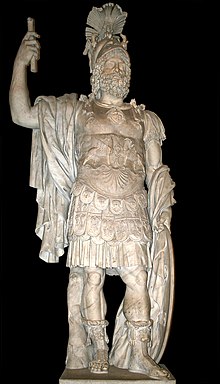Our website is made possible by displaying online advertisements to our visitors.
Please consider supporting us by disabling your ad blocker.
Mars (mythology)
| Mars | |
|---|---|
God of war, guardian of agriculture and the Roman people | |
| Member of the Dii Consentes | |
 Statue of Mars from the Forum of Nerva, 2nd century CE [1] | |
| Other names | Mavors, Mavorte (archaic, poetic) |
| Planet | Mars[2] |
| Symbols | spear, shield [3] |
| Day | Tuesday (dies Martis) |
| Festivals | February 27, March 14 Equirria horse races March 1 Dies natalis (birthday) and feriae of the Salian priests March 17 Agonia May 14 dies natalis, Temple of Mars Invictus October 15 October Horse sacrifice October 19 Armilustrium |
| Genealogy | |
| Parents | Jupiter and Juno |
| Siblings | Vulcan, Minerva, Hercules, Bellona, Apollo, Diana, Bacchus, etc. |
| Consort | Nerio and others including Rhea Silvia, Venus, Bellona |
| Children | Cupid, Romulus and Remus |
| Equivalents | |
| Etruscan | Maris, Laran |
| Greek | Ares |
| Norse | Tyr |
In ancient Roman religion and mythology, Mars (Latin: Mārs, pronounced [maːrs])[4] is the god of war and also an agricultural guardian, a combination characteristic of early Rome.[5] He is the son of Jupiter and Juno, and was pre-eminent among the Roman army's military gods. Most of his festivals were held in March, the month named for him (Latin Martius), and in October, the months which traditionally began and ended the season for both military campaigning and farming.[6]
Under the influence of Greek culture, Mars was identified with the Greek god Ares,[7] whose myths were reinterpreted in Roman literature and art under the name of Mars. The character and dignity of Mars differs in fundamental ways from that of his Greek counterpart, who is often treated with contempt and revulsion in Greek literature.[8] Mars's altar in the Campus Martius, the area of Rome that took its name from him, was supposed to have been dedicated by Numa, the peace-loving semi-legendary second king of Rome; in Republican times it was a focus of electoral activities. Augustus shifted the focus of Mars' cult to within the pomerium (Rome's ritual boundary), and built a temple to Mars Ultor as a key religious feature of his new forum.[9]
Unlike Ares, who was viewed primarily as a destructive and destabilizing force, Mars represented military power as a way to secure peace, and was a father (pater) of the Roman people.[10] In Rome's mythic genealogy and founding, Mars fathered Romulus and Remus through his rape of Rhea Silvia. His love affair with Venus symbolically reconciled two different traditions of Rome's founding; Venus was the divine mother of the hero Aeneas, celebrated as the Trojan refugee who "founded" Rome several generations before Romulus laid out the city walls.
- ^ Based on an Augustan-era original that in turn used a Hellenistic Greek model of the 4th century BCE. Capitoline Museums in Rome, Italy. Capitoline Museums. "Colossal statue of Mars Ultor also known as Pyrrhus – Inv. Scu 58." Capitolini.information. Accessed 8 October 2016.
- ^ Evans, James (1998). The History and Practice of Ancient Astronomy. Oxford University Press. pp. 296–7. ISBN 978-0-19-509539-5. Retrieved February 4, 2008.
- ^ Later represented in the astronomical and astrological symbol for the planet Mars, and the male gender (♂)
- ^ Chapter 3, Charles E. Bennett (1907) The Latin Language – a historical outline of its sounds, inflections, and syntax. Allyn & Bacon, Boston.
- ^ Mary Beard, J.A. North, and S.R.F. Price, Religions of Rome: A History (Cambridge University Press, 1998), pp. 47–48.
- ^ John Scheid, An Introduction to Roman Religion, translated by Janet Lloyd (Indiana University Press, 2003), pp. 51–52; Robert Turcan, The Gods of Ancient Rome (Routledge, 2001; originally published in French 1998), p. 79.
- ^ Larousse Desk Reference Encyclopedia, The Book People, Haydock, 1995, p. 215.
- ^ Kurt A. Raaflaub, War and Peace in the Ancient World (Blackwell, 2007), p. 15.
- ^ Paul Rehak and John G. Younger, Imperium and Cosmos: Augustus and the Northern Campus Martius (University of Wisconsin Press, 2006), pp. 11–12.
- ^ Isidore of Seville calls Mars Romanae gentis auctorem, the originator or founder of the Roman people as a gens (Etymologiae 5.33.5).
Previous Page Next Page


